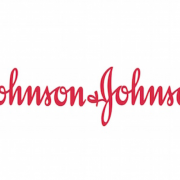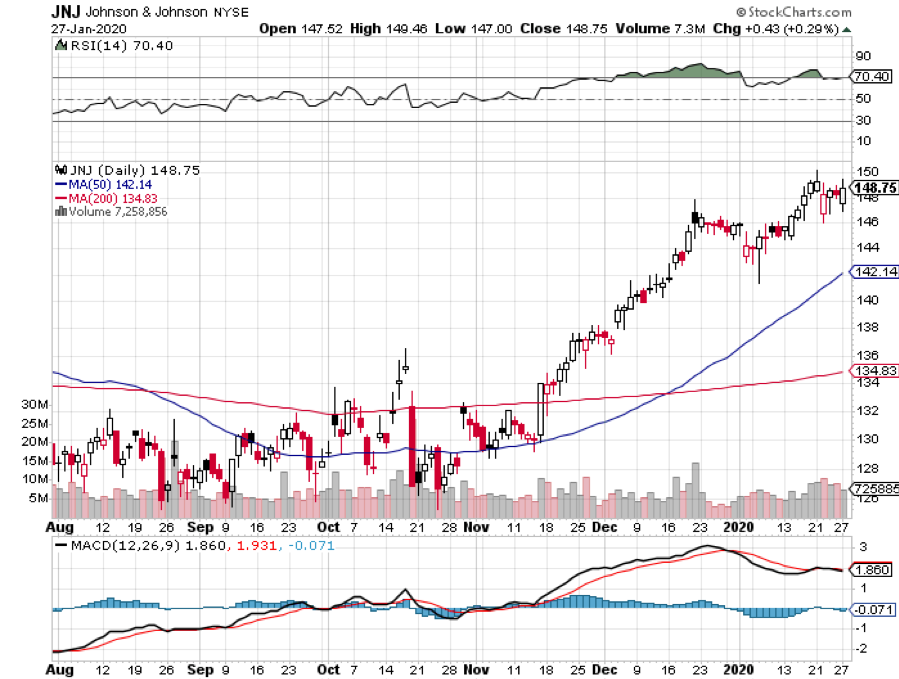Johnson & Johnson Joins the Coronavirus Battle
It looks like Johnson & Johnson isn’t walking away from the biotechnology sector anytime soon.
News of a potential exit came following the company’s move to cut down on its investment on Proventio Bio (PRVB) from 6.4%, which is around 2.4 million shares, to a 2.4% stake or 1.2 million. Further reports revealed that JNJ might sell its remaining shares soon.
JNJ’s reemergence on the front page of the biotechnology sector comes in the wake of the overwhelming fear courtesy of the coronavirus, which has already taken the lives of nearly 500 people and placed more than 24,000 patients in hospitals worldwide.
In the company’s recent announcement, JNJ executives disclosed that they are also throwing their hat in the ring in the search for a speedy vaccine to combat the deadly coronavirus.
This means that JNJ is joining Gilead Sciences (GILD), AbbVie (ABBV), and Moderna (MRNA) in the very short list of companies aiming to achieve that.
Taking a page off its success in creating a vaccine for the Ebola outbreak, JNJ is confident that it can not only come up with a coronavirus vaccine but also be able to scale it up the moment they receive FDA approval.
For context, JNJ took roughly six months to come up with an Ebola vaccine, scale the treatment, and deliver it to the public. The company spent around the same time in its efforts to produce a Zika virus vaccine.
As for the coronavirus vaccine, JNJ expects to shave off two to three months from the Ebola and Zika timelines.
While no concrete report on the progress of this initiative has been released, reports point to JNJ working with Chinese researchers to use HIV drugs to treat the widely spreading respiratory disease.
How will this impact JNJ’s performance in 2020?
For one, success on this front would definitely increase the earnings estimate for this year especially since JNJ’s fourth-quarter results failed to meet expectations on the top line. Meanwhile, the company beat the bottom line by one penny, recording $1.88 per share.
As expected, the talcum powder lawsuits continued to exert pressure on the company’s consumer goods segment.
Sales of the baby care products amounted to $421 million, exhibiting an 11% decline compared to the previous performance during the same period in 2018.
Blockbuster prostate cancer drug Zytiga has been struggling with the rise of generic rivals since 2018, slashing 13.8% off its fourth-quarter sales to $677 million.
Meanwhile, the declining sales of psoriasis moneymaker Remicade didn’t cause any major decline in the total revenue of JNJ’s pharmaceutical segment. This comes as a surprise since biosimilar competition has been gaining on the drug, cutting its fourth-quarter sales by 16.4% year over year to record $1 billion.
Despite the so-so results, the report still provided glimmers of hope that all but guarantees that JNJ shares won’t plummet in the future.
In fact, JNJ’s total fourth-quarter revenue increased by 1.7% thanks to the new products released as precautionary measures to pick up the slack from the sales decline of both Zytiga and Remicade.
For instance, psoriasis treatment Stelara managed to impress with a 17.7% increase year over year to hit $1.7 billion.
Another recently launched psoriasis injection, Tremfya, demonstrated a whopping 53.9% jump to contribute $270 million in the total revenue in the fourth quarter.
Meanwhile, younger drugs like blood cancer treatments Darzalex and Imbruvica pitched in $1.7 billion, showing off a 32.5% improvement in sales.
So although it’s unlikely that the stock will be able to produce top-line growth in the double digits as often as we’d like, JNJ remains an attractive investment.
One of its most alluring features is its diversified portfolio, which reaches across numerous business lines in the healthcare and biotechnology sectors.
This diversification has become a pillar of the company, ensuring that it doesn’t topple even in times of economic downturns.
The fact that it offers a 2.6% dividend yield makes JNJ a dream come true among income-seeking investors. It also doesn’t hurt that JNJ has consistently raised its dividends annually for the past 57 years, making it the most stable and secure out there today.
Even its lawsuits don’t seem to have any severe impact on the company’s performance since JNJ managed scores of legal cases in the past and constantly managed to come out in one piece. Taking its history as an indication, JNJ should remain as one of the top stocks in the years to come.



